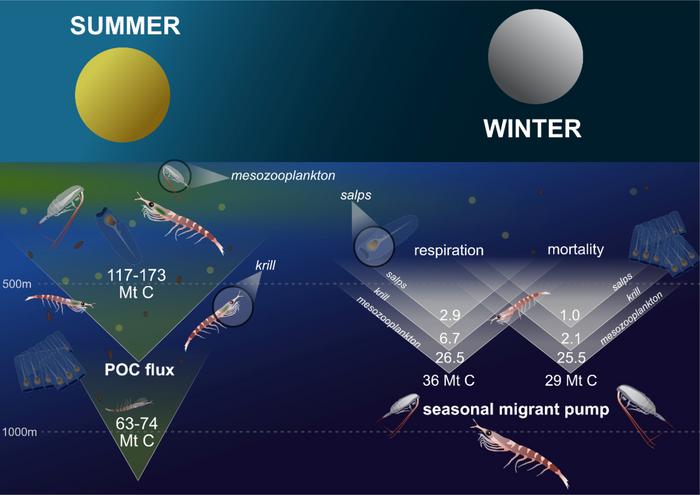A transformative stride in our understanding of the Southern Ocean’s carbon cycle has emerged from an international collaborative study, revealing the pivotal, yet previously underappreciated, role played by seasonally migrating zooplankton. This new research drastically reshapes the paradigm of oceanic carbon sequestration by demonstrating that the vertical migrations of small zooplankton species such as copepods, krill, and salps markedly enhance the transfer of carbon to the deep ocean, a process now coined as the ‘seasonal migrant pump.’
For decades, the dominant model of carbon transport to the deep ocean hinged on the passive sinking of particulate organic carbon (POC), primarily originating from surface phytoplankton consumption and waste production by large zooplankton grazers during productive summer months. This detrital material was thought to sink slowly, driven by gravity, into the abyssal depths where carbon could be sequestered for millennia. However, new quantitative assessments reveal a critical complementary process: the active, seasonal descent of zooplankton below 500 meters, where their respiration and mortality directly inject substantial amounts of carbon into the deep ocean, bypassing surface nutrient losses and accelerating deep carbon storage efficiency.
This discovery pivots our comprehension of biogeochemical cycles within polar marine systems, especially in the Southern Ocean — a colossal carbon sink responsible for absorbing roughly 40% of anthropogenic CO₂ uptake in global oceans. By compiling the most extensive database yet of zooplankton biomass and migration patterns, incorporating thousands of net haul samples spanning from the 1920s to contemporary collections, the study provides the first robust quantification of this active carbon transport mechanism. It challenges existing Earth System Models (ESMs), illuminating fundamental gaps where zooplankton-driven carbon fluxes are presently excluded.
The resulting data show that zooplankton vertical migrations transport an estimated 65 million tonnes of carbon annually to depths beyond 500 meters. This injection results from metabolic respiration and organismal death during the overwintering period. Notably, copepods—small, abundant mesozooplankton crustaceans—are the main agents, contributing 80% of this carbon flux. Krill, often emblematic of Southern Ocean ecosystems, account for around 14%, while pelagic tunicates like salps contribute the remaining 6%. This rebalancing highlights a nuanced ecosystem dynamic previously obscured in carbon cycling frameworks.
From a biochemical vantage point, the seasonal migrant pump introduces a more efficient vector for carbon sequestration compared to the sinking of detritus. Unlike passive particles that remove both carbon and vital micronutrients—such as iron, a key element limiting phytoplankton growth in high-nutrient low-chlorophyll (HNLC) regions—these migrating zooplankton effectively recycle nutrients near the ocean’s surface. This nutrient retention facilitates sustained primary production while amplifying carbon removal via direct respiration at depths unreachable by most sinking particles. Such biological mediation of carbon and nutrient fluxes exemplifies the tight coupling in polar ocean biogeochemistry.
The study also underscores how climate change may drastically perturb this delicate balance. As ocean temperatures rise, shifts in species distribution and community structure are projected. Copepod populations appear poised to increase whereas krill numbers may decline, a shift with profound implications since these taxa exhibit distinct physiological traits and migration behaviors. Alterations in the ‘seasonal migrant pump’ could cascade through the Southern Ocean’s carbon sequestration capacity, ecosystem linkages, and ultimately, the global carbon budget.
Critically, this research also calls for urgent updates to contemporary Earth System Models to incorporate zooplankton-driven carbon transport processes. Current models inadequately represent this export pathway, limiting predictive capabilities regarding future carbon cycle feedbacks in the context of anthropogenic climate change. Integrating these findings will refine estimates of oceanic carbon sinks and enhance scenarios regarding carbon dioxide removal, ecosystem resilience, and feedback mechanisms underlying global climate regulation.
In the realm of marine ecosystem management, the findings advocate for heightened protection of zooplankton habitats in the Southern Ocean. The dual threats of industrial-scale fishing—predominantly targeting krill—and climatic disruptions jeopardize a linchpin species that simultaneously supports the Antarctic food web and the biological carbon pump. Sustainable management policies are therefore imperative not only for biodiversity conservation but also for maintaining essential climate processes mediated by these migratory populations.
Furthermore, the study exemplifies the power of large-scale data integration and interdisciplinary analysis, combining ecological modeling, historical datasets, and cutting-edge oceanography. This approach has unveiled a previously invisible carbon pump, revealing ecosystem functions that might otherwise remain obscured in complex, dynamic marine environments. It offers a template for future research targeting other critical biogeochemical processes and taxa across global oceans.
In summary, this landmark study redefines the role of zooplankton migration in oceanic carbon sequestration, unveiling a substantial and previously unquantified pathway that actively injects carbon into the deep ocean during winter months. Its implications expand beyond oceanography, bridging climatology, marine ecology, and global carbon cycle science. As our planet confronts escalating climate challenges, understanding and safeguarding these natural processes becomes paramount to global climate mitigation efforts.
Subject of Research: Not applicable
Article Title: Seasonally migrating zooplankton strongly enhance Southern Ocean carbon sequestration
News Publication Date: 23-Jun-2025
Web References: http://dx.doi.org/10.1002/lno.70120
Image Credits: Yang, G. et al.
Keywords: Oceans, Ocean chemistry, Oceanography, Earth sciences, Seawater, Biochemistry, Organismal biology, Animals, Plankton, Zooplankton, Carbon capture, Carbon sequestration, Carbon sinks, Chemical engineering, Chemistry, Biogeochemical cycles, Carbon cycle, Biogeochemistry, Geochemistry, Antarctica, Antarctic climate, Climate variability, Climate systems, Climatology, Climate zones, Polar climates




